Vaccination is a procedure that accompanies people almost their entire lives. We are given the first vaccination as soon as we are born: the first 24 hours after birth. Vaccination against hepatitis B is mandatory; in fact, doctors do not even ask parents whether they agree or not. In the future, the choice of whether to vaccinate a child depends only on the decision of the parents... Unfortunately, the possibility of choice is often just an illusion. Most public kindergartens do not accept children without a complete list mandatory vaccinations.
And this is one of the reasons why it is necessary to know which vaccinations are mandatory for children in 2017.
Basic information about vaccination
The purpose of each vaccination for children is to create artificial immunity against infectious diseases. For this purpose, vaccines, serums and immunoglobulins are used.
Vaccines are aimed at creating active, long-lasting immunity. Immunoglobulins and serum preparations create passive immunity.
There are two types of vaccinations that must be done once: these include vaccinations against measles, mumps and tuberculosis, or multiple times: polio, whooping cough, diphtheria. Sometimes revaccination is necessary to maintain post-vaccination immunity.
What vaccinations are given to children: timing of vaccination
Most vaccinations are scheduled and the timing of vaccine administration to children is fixed by law. Parents, with the help of their local pediatrician, must adjust the vaccination schedule for each child individually, since vaccination is only possible if the baby is completely healthy.
Therefore, the table of vaccinations for children is primarily a rough guide for parents. They will be able to personally control which vaccinations the child needs to receive per month and which ones not. They will be able to prepare their baby in advance for the upcoming procedure, as well as study more detailed information about the disease against which the vaccine is being given. Of course, depending on medical contraindications, the vaccination schedule may change.
Vaccination calendar for children |
||
|
Vaccination period |
Name of vaccination |
|
|
From birth to one year |
The first day after birth |
First vaccination against viral hepatitis B |
|
The first 3-7 days after birth |
Vaccination against tuberculosis |
|
|
Second vaccination against viral hepatitis B |
||
|
Third vaccination against viral hepatitis B |
||
|
First vaccination against pneumococcal infection |
||
|
First vaccination against diphtheria, whooping cough, tetanus (DTP) |
||
|
The first immunoprophylaxis of hemophilus influenzae infection and polio |
||
|
4-5 months |
Second vaccination against DTP |
|
|
Second vaccination against Haemophilus influenzae and polio |
||
|
Second vaccination against pneumococcal infection |
||
|
6 months |
Third vaccination against diphtheria, whooping cough and tetanus |
|
|
Third vaccination against hepatitis B |
||
|
Third vaccination against Haemophilus influenzae and polio |
||
|
12 months |
Vaccination against measles, rubella, mumps |
|
|
Fourth vaccination against viral hepatitis B |
||
|
From one year to 14 years |
15 months |
Revaccination against pneumococcal infection |
|
1.5 years (18 months) |
First revaccination against diphtheria, whooping cough, tetanus |
|
|
First revaccination against polio |
||
|
Revaccination against Haemophilus influenzae |
||
|
1.7 years (20 months) |
Second revaccination against polio |
|
|
Revaccination against measles, rubella, mumps |
||
|
Second revaccination against DTP |
||
|
First revaccination against tuberculosis |
||
|
13 years old (girls) |
Vaccination against human papillomavirus infection |
|
|
Third revaccination against diphtheria, tetanus |
||
|
Third revaccination against polio |
||
|
Third revaccination against tuberculosis |
||
The vaccination schedule for children is updated periodically: carefully monitor updates and coordinate vaccination times with your doctor.
Vaccinations for children under one year of age: what may be contraindications
As you can see in the list above, the very first vaccine that a baby is given is the hepatitis B vaccine.
It should be noted that the schedule for introducing vaccinations against hepatitis B for children in Russia has its own characteristics. If the child does not have any medical contraindications, then the immunoprophylaxis scheme looks like this: 1 day after birth – 1 month – 6 months.
If the child belongs to the risk group, then immunoprophylaxis is carried out in a slightly modified mode: 1 day of life - 1 month - 2 months - 1 year. A child may be considered at risk if the mother was diagnosed with hepatitis B during pregnancy.
The second vaccination, which raises many questions: the BCG vaccine, which is designed to create artificial immunity against tuberculosis in a child.
There are certain contraindications to the introduction of BCG into the body:
- Defeat of the central nervous system– neurological symptoms are clearly expressed;
- The child was born weighing less than 2 kg;
- The child is infected with HIV;
- The presence of malignant tumors;
- Infection acquired in the womb;
- ABO incompatibility is a hemolytic disease.
The reaction to the vaccine can take the form of a strong enlargement of the papule: there may be discharge of fluid or pus, and rough keloid scars. If complications of any kind occur, take your child to the doctor immediately.
Vaccination against polio is carried out by the oral method: drops are called OPV. Vaccination against hemophilus influenzae, as well as vaccination against hepatitis B and DPT, is one of the most difficult for a child’s body.
It is necessary to prepare for redness, hyperthermia, and rashes at the injection site. Temperature after DTP vaccinations– also the reaction is not uncommon. You can defeat it with antihistamines and antipyretics.
After being vaccinated against measles, rubella and mumps, a child may feel slightly unwell and may have a fever. Small rashes may appear after 4-15 days.
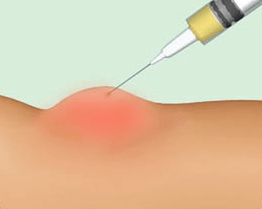
Vaccinations for children from 1 year to 14 years
This time period is characterized mainly by repeated vaccinations. Their goal is to strengthen previously acquired immunity.
It is worth special mentioning vaccination against tick-borne encephalitis, which is allowed for the first time only when the child reaches the age of 15 months.
Mantoux test and its alternatives
Do not forget about the annual procedure under a name well known to all parents: the Mantoux test.
It is a mistake to think that the Mantoux test is one of the preventive vaccines. Vaccination is not aimed at preventing tuberculosis, but at detecting it. The Mantoux test is just a test by which you can find out whether microbacteria that cause tuberculosis are present in the body.
Here we are faced with the illusory choice that clinics give to parents. Everything seems to be according to the rules: if you don’t want to, don’t do it. But it's not that simple.
Sanitary and epidemiological rules SP 3.1.1295-03 state that if the reaction to the Mantoux test shows a positive or uncertain result, parents are required to visit a phthisiatrician within a month to refute or confirm the data. Your child will only be able to go to school or kindergarten with an official document stating that the reaction was false.
So what do we get?
Not only those who are busy going to the TB doctor are often not allowed to attend classes in children's institutions, but also children whose parents are against the Mantoux test. What to do? First of all, don’t worry: there are no legal grounds for removing your child from an educational institution. Denial of admission is recommended, but not prescribed by law. But by refusing to check your child for microbacterial infection, you not only endanger his life and health, but also put other children at risk.
Try replacing the classic test with a test developed in Russia: Diaskrintest - or the Pirquet test.
These methods are quite effective, safe and reliable.
Vaccination table:

Rubella, hemophilus influenzae and. It is from them that the baby is vaccinated in the first year of his life, and they begin to do this right in the maternity hospital.
Vaccinations
Routine immunization of children is carried out in all regions of the country according to the schedule of the National Calendar of Preventive Vaccinations. The timing and schedule for administering vaccines are clearly defined based on the child’s age, the risk of morbidity and the speed of development of immunity.
important The compulsory vaccination plan for children includes only those infections that can actively and massively spread, have a severe clinical course and are often complicated (even fatal outcomes are possible).
| Age of children | Name of vaccination | Note |
| First 24 hours of life | First | Genetically engineered vaccine |
| 3-7 days of life | Vaccination against tuberculosis () | For premature babies, vaccinations are delayed until later. late date or vaccinated with a “weakened” BCG-M vaccine |
| 1 month | Second vaccination against viral hepatitis B | |
| 3 months | First (DPT 1)First (IPV 1)*First | IPV 1 - inactivated vaccine |
| 4.5 months | Second vaccination against whooping cough, diphtheria, tetanus (DPT2)Second vaccination against polio (IPV2)Second vaccination against Haemophilus influenzae | |
| 6 months | Third vaccination against whooping cough, diphtheria, tetanus (DPT3) Third vaccination against polio (IPV3) Third vaccination against viral hepatitis B Third vaccination against Haemophilus influenzae | |
| 12 months (1 year) | (CPC) | |
| 18 months (1.5 years) | First revaccination against whooping cough, diphtheria, tetanusFirst revaccination against polio (OPV1) Revaccination against Haemophilus influenzae | OPV 1 - live vaccine |
| 20 months | Second revaccination against polio (OPV 2) | |
| 6 years | Revaccination against measles, rubella, mumps (MMR) | |
| 7 years | Revaccination against tuberculosisSecond revaccination against diphtheria, tetanus () | Revaccination against tuberculosis is carried out for children who are not infected with Mycobacterium tuberculosis and have a negative |
| 12-13 years old | Vaccination against rubella*Vaccination against hepatitis B** | *carried out only to girls who have not previously been vaccinated or who have received only one vaccination **carried out to all previously unvaccinated girls according to the 0-1-2-12 month schedule |
| 14 years old | Third vaccination against diphtheria, tetanus (ADS-m) Revaccination against tuberculosis Third revaccination against polio |
additionally Children from 6 months of age can be vaccinated against influenza annually during epidemics.
Since 2014, another free one has been added to the national child vaccination calendar. Pneumococcal infection, according to WHO, is recognized as the leading cause of morbidity and mortality among children under one year of age. Thus, the list of mandatory vaccinations will include vaccination against the 12 most dangerous diseases.
In addition to the provided state program vaccinations for children under one year of age who are at risk, voluntarily You can be vaccinated against hepatitis A, chickenpox and meningococcal infection.
At the age of 12-13, girls who are at risk for developing cervical cancer, acute and chronic infections caused by the human papillomavirus are vaccinated against the papillomavirus in accordance with the instructions for the use of vaccines.
What is vaccination?
In the child’s vaccination calendar, there are two terms “vaccination” and “re-vaccination”: what do they mean?
Vaccination– this is the primary injection (or several primary injections) into the human body of vaccines (antigenic substances) that can ensure the formation of basic immunity to a certain disease. For example, to form basic immunity against diphtheria, three doses of anti-diphtheria toxoid are required.
Revaccination– repeated administration of the vaccine, contributing to the maintenance (extension and consolidation) of previously formed basic immunity.
information Vaccines are antigenic substances consisting of live, weakened, dead pathogens or parts thereof, to which the human body produces an immune response (antibodies).
Antibodies (Ab) circulate in the blood for a long time, forming immune memory. This means that when a microorganism enters the human body, it immune system ready to fight back right away. The body does not need time to form AT - the disease does not develop.
Should children be vaccinated?
If you want to protect your baby from infections, then the answer is "Yes". Of course, if the woman was protected from all infections (note that in most cases this was done by vaccinating her at early age), then through the placenta it will transfer some of the specific antibodies to the fetus. They are able to protect the child from dangerous infections in the first months of his life.
It is believed that children under 3 months never suffer from childhood infectious diseases. But then the ATs begin to collapse. Antibodies to diphtheria and tetanus are destroyed first (at 3-5 months), which is why a child is vaccinated against these diseases at 3 months.
Possible complications
important Unfortunately, no one can give a 100% guarantee that a child will endure vaccination, but the risk of complications from vaccination is minimized, which has been proven by many years of use.
Like all medicines, vaccines can have side effects. Basic:
- allergic reactions (, Quincke's edema, anaphylactic shock);
- temperature reactions;
- neurological complications;
- local reactions (redness, abscess at the injection site);
- damage to the lungs and tonsils, etc.
Of course, no parent wants to risk the health of their child. However, the outcome of this event often depends on the vigilance of parents. They must clearly understand what cannot be done on the eve of vaccination and when it cannot be carried out.
- For any vaccination there is an indisputable rule: the child must be healthy at the time of vaccination. Moreover, if the baby was sick, then at least two weeks should pass after recovery.
- If the child is absolutely healthy, but someone in the household is sick, then it is better to postpone vaccination.
- Two to three days before and after vaccination, it is necessary to limit the child’s contact with a large number of people.
- Vaccinations that cause a temperature reaction (for example,) are best carried out against the background of antiallergic drugs, starting to give them 2-3 days before the vaccination.
- On the eve of vaccination, do not overfeed your child with new foods, as unknown food components will create an even greater burden on the body.
- Before vaccination, be sure to see a doctor. He must assess the condition of the baby and give permission for vaccination.
After vaccination, you must be under the supervision of medical personnel for at least half an hour. This is necessary so that they can assess the body’s response to the vaccine and, if necessary, provide emergency assistance.
information At home, it will be useful for your child to sleep after vaccination: during sleep, the immune system is better mobilized. You cannot bathe your baby on this day.
Conclusion
The vaccination schedule for each child is compiled individually. Remember that the intervals between vaccine administrations cannot be shortened, but can be increased according to indications. There is no need to rush to get vaccinated if there are doubts about the child’s health – this will protect him and keep the parents calm.
Vaccination calendar 2017 Russia table with the latest changes, as well as important information about vaccination for doctors and parents. The frequency and rules of vaccination are outlined in the rules of the Ministry of Health - on their basis, a calendar is drawn up, which can change in accordance with the individual characteristics of the child. Considering a certain percentage of complications and even deaths after vaccinations, in recent years not only vaccination standards have been somewhat simplified, but also parents have been allowed to send their children to kindergartens and schools without vaccinations. Of course, in some places you still have to exchange official letters in order for a child to be accepted, but now at least the possibility of such an arrangement has appeared.
Parents and doctors have mixed opinions about vaccinations. On the one hand, vaccines have saved millions of lives. On the other hand, no parent wants his child to join the sad statistics, or even die. Another big drawback of modern vaccinations is that thanks to our president and the patriotic hysteria inflated by his lackeys, imported good vaccines have almost stopped being imported to Russia. But Russian medicine in this area has remained at the level of the 60s; Kobzon’s example, so to speak, is more eloquent than a pompous parade. Therefore, parents who are a thousand times safer than the Russian one can be completely understood.
The table of the vaccination calendar for 2017 in Russia indicates the age at which one or another vaccination is given:
|
At what age and when is the vaccine given? |
Name of vaccination |
Conditions for vaccination, is it possible and what are the restrictions? |
|
Newborns, in the first two days after birth. |
First vaccination against hepatitis B. |
It is given to all children after birth, especially newborns whose parents had hepatitis B. If someone is registered at a drug dispensary, refusing vaccination will be a difficult procedure. |
|
On the 3rd or 7th day after birth. |
Vaccination against tuberculosis |
The first serious vaccine. It is placed in the shoulder and leaves a scar. The reaction can be strong. |
|
At 1 month of life |
Repeated vaccination against hepatitis B |
It is given to all children without restrictions. |
|
2 months |
Third vaccination against hepatitis B |
No restrictions. |
|
3 months |
DPT – for diphtheria, whooping cough and tetanus. The first vaccination of this type. |
The most dangerous vaccine. Therefore, mothers in Russia are trying to get imported vaccines. If the baby is premature, it is better to wait. |
|
From 3rd to 6th month |
The first vaccination against Haemophilus influenzae infection. |
They are carried out for children at risk - if there is a tendency to this disease, HIV, or parents are in prison. |
|
4 to 5 months |
First polio vaccine. |
It is done orally (dropped into the child’s mouth) or by injection. The drops are a Russian vaccination, the injection is imported. The temperature may rise and diarrhea may begin for a couple of days. |
|
Second DTP vaccination. |
The exact date will be indicated after the first vaccination. If there are problems with the baby’s health, it is worth discussing re-vaccination with your pediatrician. |
|
|
Second vaccination against Haemophilus influenzae infection. |
||
|
Second polio vaccine. |
No restrictions for healthy children. |
|
|
Child from 6 months. |
Third DTP vaccination. |
This is given to all children, but there may be individual restrictions. Naturally, if the second stage was missed, they do it. It is necessary to observe the periods and maintain the child’s immunity in good condition. |
|
Third vaccination against hepatitis B |
||
|
The third vaccine against Haemophilus influenzae |
||
|
Third - from polio |
||
|
The child is 1 year old. |
Combined vaccination against measles, rubella, mumps. There may be separate vaccines. |
There are Russian vaccines and imported ones - Ruvax, MMR, Priorix. Contraindications – allergies (especially to eggs), weak immunity. |
|
The fourth vaccination against hepatitis B. |
||
|
Children aged 1.5 years. |
Revaccination against diphtheria, whooping cough and tetanus, polio, hemophilus influenzae. |
Everything is according to age, individual restrictions are provided. |
|
The child is 2 years old. |
Vaccination against polio. |
|
|
Child – 6 years old |
Revaccination: measles, rubella and mumps. |
It is placed to maintain immunity from these diseases. Omitted due to individual characteristics. |
|
Children 6-7 years old |
Second revaccination against diphtheria and tetanus. |
They do it on the basis of individual instructions, most often after tests. |
|
Children aged 7 |
Revaccination against tuberculosis. |
If the Mantoux reaction is negative. That is, if after Mantoux there is no trace left on the hand. |
|
Teenagers after 14 years |
Another revaccination against diphtheria and tetanus infection. |
Usually it is given to all children without immune disorders. They are vaccinated at school. |
|
From polio. |
||
|
Children and adults under 18 years of age |
BCG for tuberculosis. |
With a negative Mantoux reaction. |
|
Another revaccination against diphtheria and tetanus. |
Will be installed every 10 years. |
|
|
Children and adults from 1 to 18 years old |
Vaccination against rubella. |
Children who have not had this disease. It is also given to girls of childbearing age from 18 to 25 years old who have not been vaccinated before. |
|
Schoolchildren, students, adults from 6 years old. |
Flu vaccination. |
|
|
Teenagers aged 15-17 years |
Measles vaccine. |
It is given to everyone who has not been vaccinated before and has no contraindications. |
It is necessary to understand that the frequency of revaccinations depends on the type of vaccination itself. Somewhere they use dead virus cells, somewhere – its inactive strains. Accordingly, the period of the next vaccination will be determined by the instructions. And – the characteristics of the child’s immunity.
There are no specific dates on the calendar. But, for example, many schools try to do BCG in the fall, during the period when the child’s immunity is still strong after the summer. IN educational institutions There is an internal schedule for vaccinations, determined by various factors. For example, periods of delivery of medicines, or peculiarities of staff employment. They draw up a vaccination schedule, a plan for the site, and follow it.
There are very good doctors, for example, the famous pediatrician Komarovsky. By the way, he does not express any thoughts against vaccinations, but gives correct advice on their use. Therefore, it is best to find a good family pediatrician, preferably in a private clinic, who will individually determine the timing. Or maybe he will advise you not to vaccinate at a specific moment. Why is a private doctor so important?
Because in a public hospital doctors get paid pennies. Not only do they rarely perform their duties well, but they also fill out vaccination reports. If the pediatrician fulfilled the vaccination plan in her area, she was given a bonus. Accordingly, she didn’t care to look closely at the allergic rashes on your baby’s cheeks or his recent cold. She will give it in any case, unless the child has obvious contraindications, for which she can then be put on trial. But the point is that all the blame will still be placed on the parents. So a good doctor is the way to a safe vaccination.
The second point concerns the type of vaccine. It is best to install an imported one, but which has already been used and tested several times. It is a myth that experiments are performed on Russian children. Because any vaccine made in Europe undergoes clinical trials, receives hundreds of certificates, and is also tested in Russia. It’s just that the older the medicine, the more experience there is with it.
It must be remembered that new calendar Vaccinations 2017 in Russia do not oblige parents to anything. You don’t have to give any vaccines at all, but following the schedule provides protection for a healthy child and also eliminates conflicts with the administration of schools and kindergartens.
Most vaccinations in our country are mandatory. For workers and students of secondary specialized and higher educational institutions, vaccination is mandatory. There is a vaccination schedule for adults, which is developed in each country by the Ministry of Health. Let’s take a closer look at which vaccines are included in our country’s calendar.
Why adults need vaccinations
The vaccination calendar is developed individually in each region, based on its characteristics and capabilities. When developing, we take into account the following factors:
- Epidemiological features in this zone;
- Financial capabilities of the region;
- Recommendations from specialists.
Vaccinations for adults can prevent epidemics of encephalitis, meningitis, hepatitis, measles and many other diseases. Before the introduction of a mandatory vaccination schedule, the mortality rate was 80% higher. Mandatory vaccinations are necessary for the population who fall into special risk groups: the elderly, pregnant women, people with certain sexual characteristics (homosexuals).
Some vaccines are given to people associated with one or another type of infection, due to the specifics of their professional activity or hobby. Thus, vaccination against rabies and encephalitis is recommended for hunters or people working in the forest. Mandatory for measles and hepatitis are done during military service, students in higher education educational institutions. It is suggested that flu injections be given at the place of work. It is imperative to protect yourself from viral diseases medical workers and people directly associated with patients. If there are children or pregnant women in the house, then all family members must be vaccinated against measles, rubella, chicken pox, hepatitis, and meningitis. Revaccination is carried out according to the scheme, which can be seen in the photo.
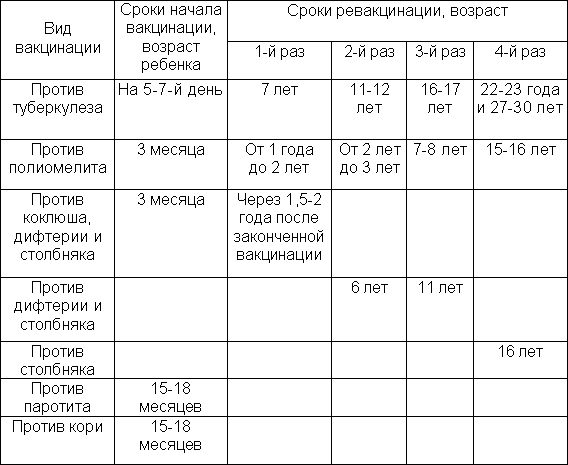
The population is vaccinated in clinics at the place of residence or in the medical unit at the workplace.
The situation is more complicated with the non-working part of the population. The attending physician will remind you about the vaccination schedule, but the person must take the initiative themselves. Ampoules for seasonal diseases can be supplied to the clinic for free. Ask your doctor when you need the vaccine.
Vaccinations included in the calendar
The vaccination calendar includes vaccines that are given every year and every few years. Let's look at the mandatory vaccinations that are included in the document:
Got used to the flu
It is done once a year for people over 18 years of age. Vaccination is free for workers and students. Vaccination is carried out at work or at university. Unemployed people and retirees can get vaccinated at a local clinic.
Vaccination against pneumococcal infection
Done up to 60 years of age. Risk groups include smokers, students, and pregnant women. The injection helps prevent diseases: pneumonia, meningitis. This is done at will, for a fee.
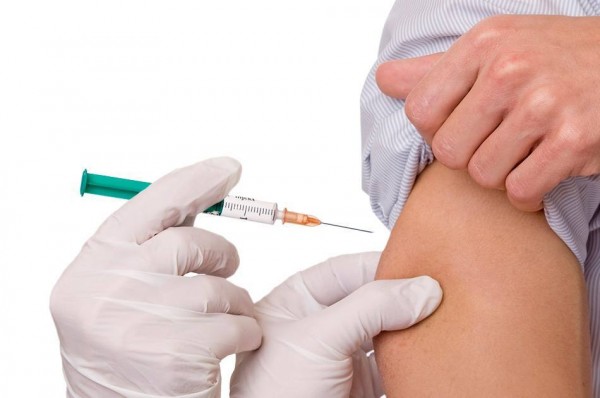
Vaccination against lichen
Workers in the forestry and livestock sectors can become ill with ringworm. At large agricultural complexes, workers are vaccinated free of charge. The rest of the population receives the injection up to 60 years of age if desired.
Hepatitis B
Vaccinations are performed up to 55 years of age, once every 10 years. It is performed in local clinics free of charge. Risk groups include: pregnant women, employees of specialized medical institutions, and patients with diabetes.
BCG for tuberculosis
People under 35 years of age are included in the compulsory calling calendar for tuberculosis. Further, vaccination is performed at the age of 55, upon request, for a fee.
Chickenpox
Chickenpox vaccination is mandatory for people of childbearing age or if there is a child in the family. Performed upon request in the clinic.
DTP
Vaccination against whooping cough, diphtheria and tetanus is performed in combination with DTP or separately. The vaccination schedule includes vaccinations against these diseases for people of any age. Pregnant women are offered to get vaccinated directly at the antenatal clinic. This is done with an interval of 10 years from the last revaccination.
Measles
Measles vaccination. Vaccinated against measles, mumps and rubella. The measles vaccine is included in the compulsory vaccination calendar of any region. The injection is given to adults from 18 to 25 years of age. The male part of the population should be vaccinated in the army. Measles vaccination is also given to pregnant women in the first trimester. Measles, once in the body of a pregnant woman, can provoke irreparable changes in the development of the fetus or cause premature birth. People with weakened immune systems need vaccinations against measles and hepatitis first.
Meningitis
Vaccination against meningococcal infection. Meningitis is included in the vaccination calendar in universities and in the military service. Done before 24 summer age.
Hepatitis A vaccination
Performed up to 25 years of age. People with promiscuous sex life are at risk.

Rabies
The vaccination must be done once a year until the age of 60. According to the calendar, injection is required for: hunters, dog handlers, zoo workers, and forest rangers. Done as desired.
Encephalitis
It is carried out in three stages, once a year. To protect yourself in the summer, vaccination begins at the end of winter (January, March, June). Vaccination is paid, costs from 150 rubles.
Polio
It is done for adults who live in an area with a high epidemiological threshold.
Not all vaccines included in the schedule are mandatory. The territorial epidemiological threshold is of great importance. So, in the southern part of Russia, polio is mandatory, in the middle zone it is optional. Mandatory vaccinations include measles, redness, and hepatitis B.
Not all drugs are compatible, so it is important to correctly draw up your personal calendar. The immunologist, based on individual examinations, will recommend which optional vaccines and when it is best to do it.
When should you refrain from vaccination?
It is necessary to refrain from vaccinations in the following cases:
- ARVI or ARI disease.
- Bacterial infection.
- Age over 70 years.
- The individual is intolerant to some components of the vaccine.
- Allergy in acute form, vaccination is postponed until remission of the disease.
- Honorable insufficiency.
Every parent worries about their little bundle of joy, and has questions and concerns when it comes time for vaccinations for children under 1 year old. In Russia, like in any other state, they care about the well-being of the population, and especially the health of the younger generation.
Compulsory vaccinations are a guarantee that young people in the country will be healthy. And to help new parents, the state has published and approved a national vaccination calendar. The vaccination calendar has been released to educate parents so that they know when these vaccines should be given.
- Like vaccination itself, the vaccination calendar is undergoing some changes. The change in the vaccination calendar is primarily due to a change in the procedure for vaccination. It is not necessary to give injections to everyone, just everyone should know that babies under one year of age are highly susceptible to infections, and if your child does not have serious and justified contraindications, then, according to the recommendations of organizations responsible for healthcare, you should not avoid vaccinations for epidemic reasons and especially immunoprophylactic ones.
- The regional vaccination calendar for epidemic indications is intended for certain individuals, i.e. those who live in areas with a possible outbreak of an epidemic, such as tick-borne encephalitis, pneumococcal infection, mumps, anthrax and others. In turn, by looking at the calendar of preventive vaccinations, you will find out how many vaccines the doctor should give your child once a year, up to a year, and generally up to what age.
- The vaccination calendar is constant, and it describes the specific vaccination age and the list of vaccines required for administration to newborns. The WHO global vaccination calendar includes other vaccines than the Russian preventive vaccination calendar. This is due to the fact that different areas of the earth have different degrees of incidence of a certain infection.
For example, in the USA and European countries they vaccinate against hepatitis A, and in Russia against tuberculosis. It all depends on the habitat and the most frequent outbreaks of one of the diseases in a certain area.

From the moment of birth and for 12 months, little people need an immunoprophylaxis procedure.
The official vaccination calendar for children under 1 year of age in 2017 includes:
- Toddlers are vaccinated within 24 hours from birth to prevent viral hepatitis B (No. 1). Hepatitis B is a disease that leads to disruption of the detoxification function of the liver (jaundice);
- The second plan for newborns (on days 3 - 7) is anti-tuberculosis BCG vaccination or BCG-M (first). The timing of these two vaccines is before discharge from the hospital;
- A month after birth, at the clinic they are vaccinated again - hepatitis B (second). After discharge, no one in the maternity hospital does it, so you should take the baby to a local clinic where the injection will be administered;
- If the child is at risk (if the parents are carriers of the virus), then hepatitis B is diagnosed in the second month from birth (third for the risk group);
- For pneumonia and ear inflammation (otitis) at two months of age, the baby can be given a vaccine against pneumococcal infection (No. 1).
- At three months of age, the first vaccinations against whooping cough, tetanus and diphtheria are given. Whooping cough is an infection that provokes an acute spasmodic cough, diphtheria is a very dangerous disease that provokes inflammation of the upper respiratory tract with damage to the ENT organs, tetanus is also an infectious disease that causes terrible attacks of tetanic convulsions against the background of damage to the central nervous system. In order to prevent the development of these diseases, they are vaccinated with the DTP vaccine. The abbreviation DTP itself consists of the names of the listed infectious diseases. The letter “A” in the name means that the vaccine is adsorbed and cell-free;
- Hepatitis B vaccination plan (third time) for preventive purposes, also given to babies at three months;
- Since 2011, the order approving the national vaccination calendar has included a vaccine that prevents hemophilus influenzae infection. It is also done for three-month-old babies, but at the request of the parents or if the baby is at risk, or lives in an area where an outbreak of this very infection has been established. Since immunity in babies has not yet been formed, vaccination is carried out up to 5 years, after the age of five year old child is quite capable of independently coping with the disease and developing the necessary antibodies and the Haemophilus influenzae vaccine is not required;
- Another “three-month” vaccine is against polio (the first). The first polio vaccine in life was administered in an inactivated form (i.e., the strain of the virus itself is non-living) and it is administered as an injection intramuscularly or subcutaneously.
- When the baby turns four and a half months old, vaccinations are repeated; in other words, previously administered vaccinations are revaccinated. DPT (second), inactivated polio (second) and, in cases of risk, pneumococcus (second) are reintroduced. Revaccination can be carried out with ADSM vaccination. The ADSM excludes the pertussis component. ADSM itself is administered only if the baby has previously been vaccinated against whooping cough, i.e. DTP was introduced.
- At the age of six months, babies will again have to undergo (for the third time) a revaccination of the vaccinations administered at 3 months of age. The only difference is that the hepatitis B vaccination is repeated every six months and a live, rather than inactivated, polio vaccine is administered. Plus it is alive, so there is no need to inject the child; it is administered orally (in the form of drops). And another (the third) revaccination with DTP or ADSM;
- At one year old, the babies will have to undergo a new (last for the year) vaccination (measles, mumps, rubella) and again against hepatitis (the fourth for children from the group of vaccinations for epidemic indications). This virus affects only the human body; a child can become infected even in the womb. Many people are interested in where this vaccination is given to one-year-old toddlers? The answer is that this vaccination is injected into the baby’s leg, i.e. into the outer thigh.
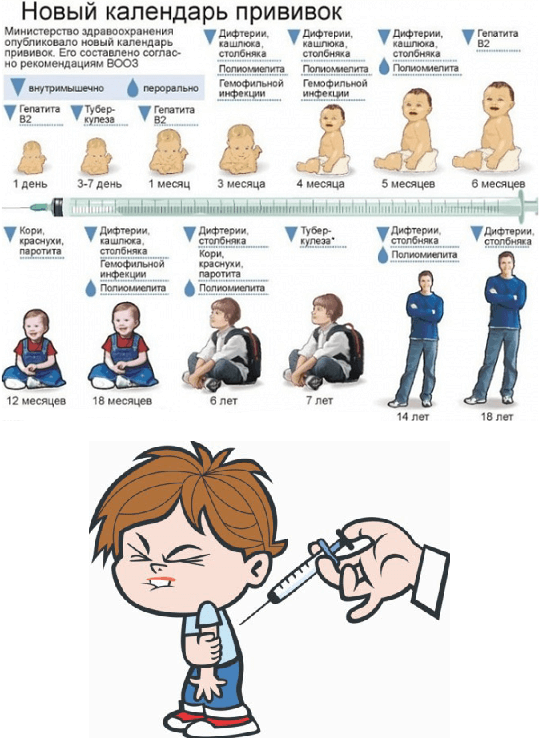
Children under two years of age should receive a total of fourteen vaccinations. Many will think that this is a lot, but overpaying for treatment in case of infection is even worse. Since such infections do not go away without complications, more effort, nerves and finances will be spent than to do everything in a timely manner. The only exceptions are children who have contraindications (recorded by doctors, and not, in the personal opinion of their parents) and a medical exemption from injections.
What laws govern childhood vaccinations?
 In March 2014, the Ministry of Health of the Russian Federation issued an order approving the national calendar of vaccinations and vaccinations for epidemic indications. This order contains the basic procedure for carrying out immunoprophylaxis and a list of medicinal immunoprophylactic drugs intended for administration.
In March 2014, the Ministry of Health of the Russian Federation issued an order approving the national calendar of vaccinations and vaccinations for epidemic indications. This order contains the basic procedure for carrying out immunoprophylaxis and a list of medicinal immunoprophylactic drugs intended for administration.
So, for example, the order describes that if immunoprophylaxis against pneumococcus was not given to babies from birth to six months, then at an older age it is carried out twice with an interval of 2 months.
Another law “On the sanitary and epidemiological welfare of the population” and “Protecting the health of citizens” according to the legislation Russian Federation controls and ensures the sanitary and epidemiological welfare of its population.
The 2017 vaccination calendar itself is just recommendations. This does not mean that if you can refuse, then it is better not to do them at all. Any state tries to protect its citizens, not only territorially, but also from diseases. All procedures are carried out free of charge.
If suddenly you do not trust domestic drugs, then you can purchase imported options. But just remember that when using them on children, you should make sure that they are suitable and when handing them over to the doctor for injection, do not forget to present a receipt from the pharmacy.
How to refuse vaccination
Remember that refusal or medical withdrawal from immunoprophylaxis must be strictly reasoned, since the health of your baby is at stake. If all the pros and cons are weighed, then you should write a corresponding statement addressed to the head physician of the district clinic.
In the application, you must indicate that you take full responsibility for making this decision on yourself (the parent) and ask that this request be carried out without hindrance. Also in your application, you can mention the laws and orders regulating immunoprophylaxis, and that no one has the right to dispose of your right to refuse medical intervention.
Table: vaccination calendar for 2017
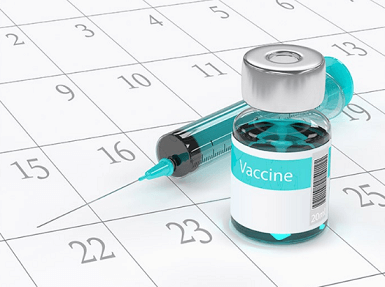
| Immunoprophylaxis | Age category | ||
| From 0 to one year | From one year to 18 years | 18 years and older | |
| Hepatitis B | + | ||
| Tuberculosis | + | + (every 7 years) | + |
| Diphtheria, whooping cough, tetanus | + | + | + |
| Haemophilus influenzae infection | + | + | + (if you have not been vaccinated before) |
| Polio | + | + | + (if you have not been vaccinated before) |
| Measles, rubella, mumps (mumps) | + (at 12 months) | + | + (if you have not been vaccinated before) |
| Pneumococcal infection | + | + | + (if you have not been vaccinated before) |
| For the flu | + | + | + |

Different vaccinations can be injected at one time, but in different places on the body (in the arm, in the thigh). Revaccination is mandatory, since each medicine has its own expiration date. Having been vaccinated only in childhood, there is no guarantee that a person will not be able to become infected with the diseases listed in the table. It is worse if the person was not given immunoprophylactic drugs at all.
Since in mature age(if you didn’t get sick in infancy or adolescence) all the “sores” only get worse and if the virus enters the body, which has no immunity to these harmful microorganisms, the disease will proceed in the most complex form.
Timely stimulation of cells to produce antibodies ensures that the disease does not develop into a severe form. This is relevant for babies, because even when receiving all the necessary substances from breast milk, they cannot completely protect themselves from infection.
If for some reason the vaccination did not occur on time, then together with your pediatrician you should draw up an individual schedule. If time was missed due to a cold, then the injections are postponed until recovery.
What diseases do vaccinations protect against?
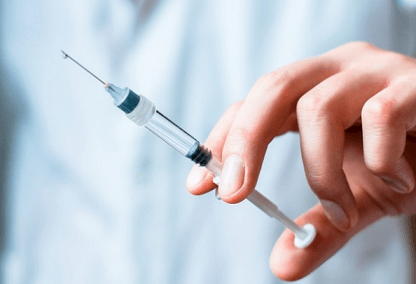
You need to know that immunoprophylaxis was not invented just to make fun of people. The World Health Organization (WHO) has decided to approve a calendar of preventive vaccinations to combat the most severe pandemics of mankind. It's different in every state. The world calendar contains 30 immunoprophylactic vaccines, 12 are used in Russia.
Preparing for vaccinations – School of Dr. Komarovsky
BCG

- BCG is an anti-tuberculosis vaccine. It is done as mentioned above in infancy, literally on the third to seventh day after birth. The vaccine itself contains bovine tuberculosis microbacteria, but when human tuberculosis microbacteria enter the body, the immune system begins to react to them and prevents them from developing into a more complex version of the disease.
- If immunoprophylaxis was not carried out in infancy, then its first administration occurs after taking the Mantoux test. The tuberculin test, or as people say, the Mantoux test, shows whether a person is infected with a tuberculosis infection or not. If the Mantoux reaction is negative, this means that the person is not sick, i.e. he does not have the tuberculosis bacillus in his body.
In this case, immunization against tuberculosis can be carried out. But a positive Mantoux reaction does not always indicate its presence. In rare cases, a specific reaction similar to a positive reaction to tuberculin may occur in children with allergies. In such cases, additional tests are performed and the lungs are checked (fluorography) for the presence of infection. The Mantoux test is administered subcutaneously, and it is a kind of “developer” of the onset of the development of the disease.
Hepatitis B

A baby can get this viral disease during childbirth from an infected mother. This terrible disease affects liver cells, which in turn has several manifestations. Acute lesion or jaundice, cirrhosis or cancer. A baby can only become infected through blood, so immunoprophylaxis against jaundice is carried out from the moment of birth.
DTP

DPT promotes the development of its own mechanism for combating and neutralizing harmful bacteria that can provoke the development of tetanus, diphtheria and whooping cough. For those previously vaccinated, ADSM (without whooping cough) may be prescribed for revaccination. Vaccination interval: 2-6 months, 15-18 months, 4-6 years and the last vaccinations for children at 14 years of age. After this age, immunoprophylaxis is carried out every 10 years.
Reaction to vaccination
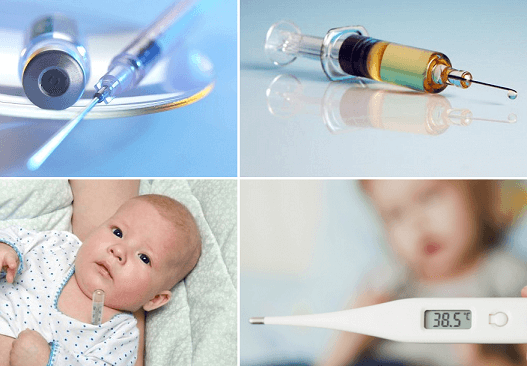
A normal reaction to all these vaccinations will be the following general manifestations::
- Increased body temperature, which goes away within 3 days (not higher than 38 degrees);
- The youngest have sleep and appetite disturbances;
- Slight swelling and redness at the injection site.
Contraindications to vaccination
If your child has a cold, then under no circumstances do immunoprophylaxis.
ARVI and others colds, even a common runny nose, as well as elevated temperature against the background of teething, weaken the protective properties of the small organism (immunity).
And a vaccinated infection will only worsen the condition. Children with allergies should be careful when administering medications.
Consult your pediatrician if you have any concerns or reasons about refusing immunization.
What you need to know about vaccinations and vaccinations

Don't fear vaccinations like the plague. Any vaccine is administered in a small dose, and the bacteria are usually in a dead state. This means that doctors will not be able to infect your baby with the injection. This only provokes the immune system to produce its own antibodies, which in adulthood will help cope with the infection. Also do not forget that the maximum duration of injections is from 5 to 10 years maximum. If you are over 30 and have not had revaccinations, then this is a reason to think about it.
Doctor Komarovsky's opinion
The opinion and point of view of Dr. Komarovsky, like that of all doctors, is obvious - if you need to do it, then do it. The pediatrician also advises not to confuse complications and a banal reaction to drugs. Komarovsky also warns that if the baby is already sick with something, then vaccinations should not be done. A child should be vaccinated only if he is absolutely healthy and in case of allergies, the doctor can prescribe antihistamines.
Vaccination calendar – School of Dr. Komarovsky



